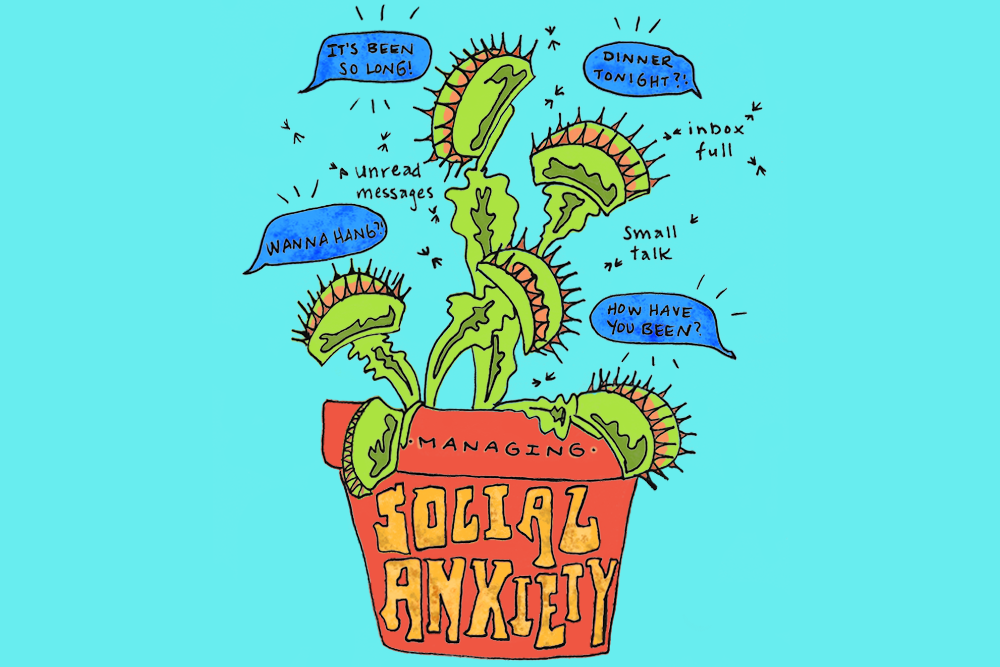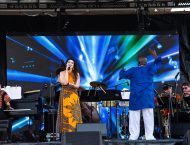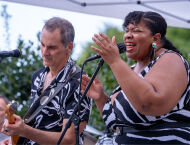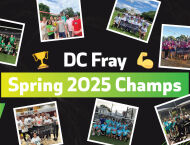Life
 Flytrap Anxiety. Illustration by Jordan Stovka.
Flytrap Anxiety. Illustration by Jordan Stovka.
One Concertgoer’s Journey to Overcoming Social Anxiety in the Age of Covid
September 13, 2021 @ 2:00pm
The excitement I felt upon buying my first post-pandemic concert ticket drained faster than it took for the house lights to fade for the opener’s set.
The sweat beading from my palms made it difficult to grasp my can of Yuengling while my eyes darted from one masked person to the other, envying how easily they made conversation. My usual worry of being involuntarily shoved into a mosh pit fell to the bottom of my list of fears, as the possibility of a stranger attempting small talk took precedence in my spiraling mind.
In the dimness of the venue, I nervously glanced down at my watch in five-minute increments, attempting to predict when the show would finally (mercifully) conclude. As much as I whispered words of encouragement under my breath, I couldn’t help but notice the nearest exit and approximate how many people I would have to snake through to make it there.
“A lot of people are experiencing definite social anxiety right now as we start to reopen,” Caitlin Masters, a graduate therapist at Healthy Foundations Group says. “Humans respond to repetition heavily, so when our repetition for the last 18-plus months has been to stay away from people — that’s the muscle that’s gotten flexed [the most].”
The National Institute of Mental Health reports approximately seven percent of American adults suffer from social anxiety. And after engaging with her patients, as well as individuals seeking help via online forums, Masters suggests that those who had trouble with social situations before Covid are being hit harder than their more extroverted counterparts.
Even still, the isolation of the pandemic may have manifested these feelings in individuals with no previous history of social anxiety.
Masters explains, “There is a sense of being not enough, being judged, feeling less competent than they used to.”
As the Covid-19 pandemic lingers, large social gatherings likely remain one of the most stressful situations for those with social anxiety. Fears of returning to the office, decisions regarding childcare and navigating extended family gatherings are also common triggers.
While severe cases may improve with medication, that is not often the first step to regaining a sense of calm and control. To that end, Masters recommends a handful of therapeutic coping strategies to be applied in anxiety-inducing situations.
Grounding Exercises
Mindfulness practices like breath work, meditation, body scans and the 5-4-3-2-1 technique all help to ease a person’s spiraling by reconnecting them to the present moment. A simple Google search of these techniques provides a plethora of resources.
“Mindfulness exercises actually counteract the chemical cascade in your body when you start to feel anxious,” Masters says.
Ranking Fears
Masters then suggests ranking challenging situations from 0-10: 0 being the least stressful and 10 being the most stressful. Then she asks clients to imagine applying the grounding exercises from above in each given situation, starting with the lowest risk scenarios, working up to the most difficult.
Setting Boundaries
When evaluating sources of anxiety, Master says, “I think a lot of anxiety can come from folks feeling like the other people in their life want more of them than what their boundaries allow.”
Masters encourages her clients to be honest about their social boundaries while extending themselves permission to accept them. Finding a friend or family member who shares the same boundaries can help an anxiety-afflicted person feel supported and accountable when implementing these boundaries in their social lives.
I breathed deeply again as I stepped out onto the sidewalk after the performance, lowered my mask and inhaled the warm, summer air. Despite my many impulses to escape, I survived to see the encore — just like I always did in the days before I knew a virus could make me so fearful of the things which once brought me joy.
I forgot how much I’d missed the ringing in my ears that followed me home, and the buzzing melodies of my favorite songs that lingered into the morning. The next day I was eager for my next concert, a feeling I never thought I could have had the night before.
I’d finally broken the surface tension which dictated the space between the past version of myself and the present one — the space the pandemic wedged itself between — and now I’m slowly inching my way back into confidence again. I hope you find your way there too, in your own time.







